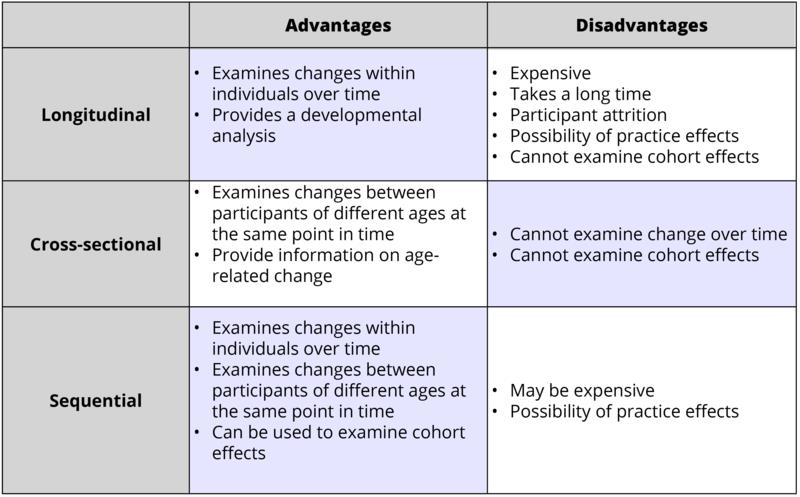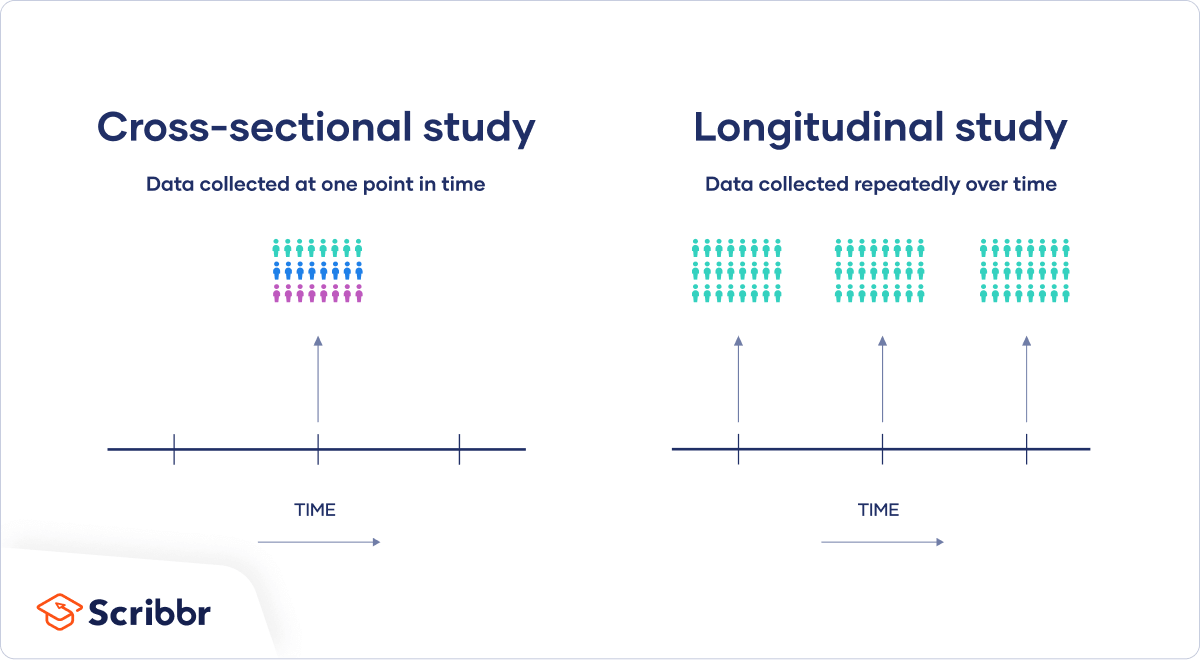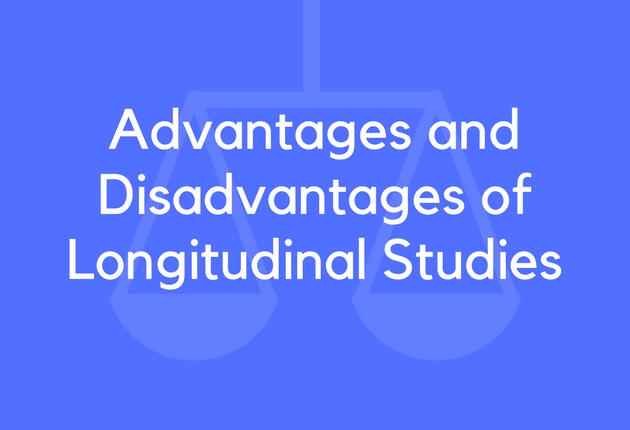Prior studies have found that rural students have disadvantages in family economic and cultural capital and advantages in social capital when pursuing higher education formulating the rural. There is a factor of unpredictability always present.

Comparison Of Advantages And Disadvantages Between Longitudinal Download Scientific Diagram
Separation of time effects.

. In a longitudinal study you can keep track of these variables in real time. An advantage of longitudinal studies is that they analyse how variables change over time eg. They provide a unique set of benefits.
The strengths of longitudinal studies They allow researchers to trace developments over time rather than just taking a one-off snapshot of one moment. Researcher get to know respondents well - strong rapport and valid data as people more likely to trust someone they know. Advantages and disadvantages Advantages Longitudinal cohort studies particularly when conducted prospectively in their pure form offer numerous benefits.
Advantages and disadvantages of longitudinal studies. Using data from the 2009 High School Longitudinal Study this article examines how family factors contribute to the ruralnon-rural differences in college expectations in the early 2010s. 6- They are generally observational in nature with quantitative andor qualitative data being collected on any combination of exposures and outcomes.
Control for cohort effects. Can give qualitative and qualitative data - producing rich information. List of Weaknesses of Longitudinal Study 1.
Advantages of longitudinal studies. This disadvantage means that such studies should have a large number of subjects who are willing to cooperate. That is individual differences are.
Time is definitely a huge disadvantage to any longitudinal study as it typically takes a substantial amount of time to collect all the data that is required. The format allows one person to influence the outcome of the study. Also it takes equally long periods to gather results before the patterns can even start to be made.
Using longitudinal studies researchers can gain insights into how small everyday choices affect our future health. As it is a long-term study its authenticity is verified in advance which makes the results have a high level of validity. Because longitudinal studies involve the same subjects over a long period what happens to them outside of the data collection moments can influence future data being collected.
The single-cohort long-term longitudinal survey has many advantages in comparison with a cross-sectional survey in advancing knowledge about offending and other types of psychopathology notably in providing information about onset and desistance about continuity and prediction and about within-individual change. The Millennium Cohort study for example suggests a clear correlation between poverty and its early impact on low educational achievement. Some people may choose to stop participating in the research.
On the other hand a retroactive study deals with historical data while a panel study includes a random sample of subjects. The ability to identify and relate events to particular exposures and to further define these exposures with regards to presence timing and chronicity. They require a large sample size.
17 Longitudinal Study Advantages and Disadvantages. Not a snapshot - shows changes in attitudesbehaviours over time - results more valid. Because of this researchers tend to have difficulty recruiting participants leading to smaller sample sizes.
Disadvantages Longitudinal studies are time-consuming and often more expensive than other types of studies so they require significant commitment and resources to be effective. Under most situations it is treated as a. A cohort study involves the observation of a similar group based on demographics like age region and life experiences.
Disadvantages of longitudinal studies. They may choose to withdraw. By making comparisons over time they can identify causes.
Disadvantages of longitudinal studies 1- It is expensive to collect longitudinal data in terms of money time. They require huge amounts of time. Possibility of Panel Attrition One disadvantages of longitudinal study is the occurrence of panel attrition.
For a long-term study to be successful objectives and rules must be established from the beginning. Top Disadvantages of Longitudinal Studies 1. Longitudinal studies rely on the expertise creativity and honesty of individual researchers for authentic conclusions.
For example a study shows that eating vegetables every day reduces your risk of death and disease by 5-6. List of Disadvantages of Longitudinal Studies. Longitudinal studies can take months or years to complete rendering them expensive and time consuming.
These may be shorter examinations or designed to collect long-term data. Longitudinal studies are a research design which requires repeated observations of the same variables over specific time periods. Like any other research design longitudinal studies have their tradeoffs.
A disadvantage of longitudinal studies is that it is hard to keep the sample intact over time if participants are not committed to the project eg. They can be costly compared to cross-sectional studies. A major advantages of longitudinal studies is the quantity and quality of the data collected enabling rich insights into and about the variables of interest including how they relate to demographic factors such as socio-economic status.
What Are the Disadvantages of Longitudinal Studies. That reliance on the individual makes it possible for the data to be corrupted or conclusions to be inaccurate. What are the pros and cons of a longitudinal study.
Say for instance you have two thousand respondents of a study taking place annually then you cover roughly twenty years for that particular research to end. Large sample size needed. Apr 1 2019 by Editor in Chief.
Longitudinal studies are better to establish the correct sequence of events identify changes over time and provide insight into cause-and-effect relationships but they also tend to be more expensive and time-consuming than other types of studies. There are some distinct advantages to each type of research some of which we have already discussed. Another advantage of longitudinal studies is that they can study variables such as gene expression cells and genetics.
Longitudinal studies are time-consuming and often more expensive than other types of studies so they require significant commitment and resources to be. Whether social mobility improves through generations of the same family. However despite the advantages of longitudinal studies there are also disadvantages.
The process of longitudinal studies itself has changed how subjects or respondents view the questions used. Longitudinal studies permit exploring continuity and discontinuity of variables the order in which. With longitudinal designs we have one main advantage.

Advantages And Disadvantages Of Multicentre And Longitudinal Imaging Download Table

Longitudinal Study Definition Approaches Examples

Research Involving Time Spans Lifespan Development

23 Advantages And Disadvantages Of Longitudinal Studies Brandongaille Com
0 Comments